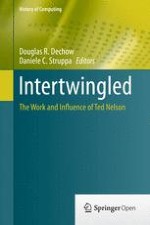Open Access 2015 | Open Access | Book

Intertwingled
The Work and Influence of Ted Nelson
Editors: Douglas R. Dechow, Daniele C. Struppa
Publisher: Springer International Publishing
Book Series : History of Computing
Open Access 2015 | Open Access | Book

Editors: Douglas R. Dechow, Daniele C. Struppa
Publisher: Springer International Publishing
Book Series : History of Computing
This engaging volume celebrates the life and work of Theodor Holm “Ted” Nelson, a pioneer and legendary figure from the history of early computing. Presenting contributions from world-renowned computer scientists and figures from the media industry, the book delves into hypertext, the docuverse, Xanadu and other products of Ted Nelson’s unique mind. Features: includes a cartoon and a sequence of poems created in Nelson’s honor, reflecting his wide-ranging and interdisciplinary intellect; presents peer histories, providing a sense of the milieu that resulted from Nelson’s ideas; contains personal accounts revealing what it is like to collaborate directly with Nelson; describes Nelson’s legacy from the perspective of his contemporaries from the computing world; provides a contribution from Ted Nelson himself. With a broad appeal spanning computer scientists, science historians and the general reader, this inspiring collection reveals the continuing influence of the original visionary of the World Wide Web.